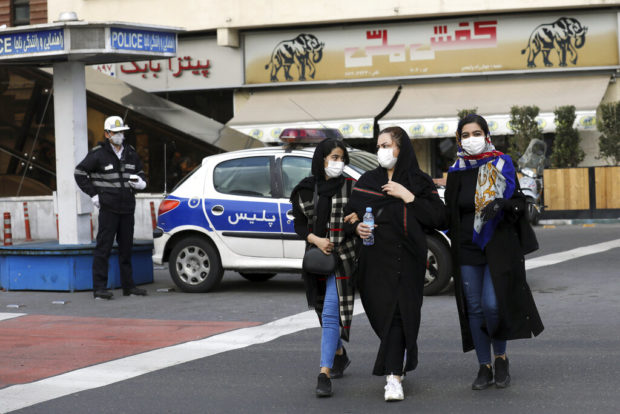
A policeman and pedestrians wear masks to help guard against the Coronavirus, in downtown Tehran, Iran, Sunday, Feb. 23, 2020. On Sunday, Iran’s health ministry raised the death toll from the new virus to 8 people in the country, amid concerns that clusters there, as well as in Italy and South Korea, could signal a serious new stage in its global spread. (AP Photo/Ebrahim Noroozi)
SEOUL — South Korea and China both reported a rise in new virus cases on Sunday, as the South Korean prime minister warned that the fast-spreading outbreak linked to a local church and a hospital in the country’s southeast had entered a “more grave stage.”
Some virus clusters have shown no direct link to travel to China.
The death toll in Iran climbed to six, the highest outside China, and a dozen towns in northern Italy effectively went into lockdown as authorities tested hundreds of people who came into contact with an estimated 79 confirmed cases there. Two people have died in Italy.
Biggest cluster in Korea
The Korea Centers for Di¬sease Control and Prevention said that 113 of the 120 new cases were reported in the fourth-largest city of Daegu and surrounding areas.
The agency said 70 of them were linked to a branch of the Shincheonji church in Daegu, which has become the biggest cluster of viral infections in the country, which now has a total of 556 cases.
Daegu Mayor Kwon Yong-jin told reporters that 247 residents had tested positive for the virus since the city confirmed its first case on Feb. 18.
That first patient is a Shincheonji church member in Daegu who has no recent record of overseas travel.
Officials said she attended church services and visited other places before being diagnosed with the disease, but they still believe it’s unlikely that the woman set off the chain of infections.
Kwon said there were concerns that the number of those infected in Daegu could see yet another massive increase because authorities were launching intensive examinations of church members with virus-related symptoms. More than 9,000 worshipers were being tested.
Downtown Daegu was mostly deserted with shelves at some supermarkets and stores empty. Many restaurants, bars, real-estate offices and tour agencies have shut down as traffic nosedived and people stayed home, ordering food and supplies online.
‘Preliminarily contained’
Mainland China reported 648 new infections for a total of 76,936. The daily death toll fell slightly to 97.
In all, 2,442 people have died in the country from COVID-19.
The number of new Chinese cases has seesawed daily but remained under 1,000 for the past four days. Several changes to how the infections are counted, however, have made it difficult to draw conclusions from the figures.
The central Chinese city of Wuhan and other parts of Hubei province, where the outbreak first emerged in December, remain under lockdown. More than 80 percent of the country’s cases are in Hubei, where the death toll has also been higher than in the rest of the nation.
‘Closed management’
China’s Politburo, made up of senior officials of the ruling Communist Party, cautioned Friday that while the epidemic has been “preliminarily contained,” the country has yet to see a turning point.
Officials signaled that regu¬lar activities should gradually resume after the virus prompted an extension of last month’s Lunar New Year holiday. Many workplaces have opted to have their employees work remotely, and schools are conducting online classes.
In Beijing, most residential communities have implemented “closed management,” limiting the number of people per household who can go in and out using exit-entry cards and requiring those just returning to the Chinese capital to isolate themselves at home for 14 days.
A cluster of infections was reported out of Beijing’s Fuxing Hospital, which has 34 confirmed cases. The hospital has been closed off to protect the surrounding community, said a statement from Xicheng district authorities.
More than 500 cases also have been found in prisons across the country.
The Korea Centers for Disease Control and Prevention said a male patient hospitalized at Cheongdo city, near Daegu, died on Sunday, the country’s fourth fatality. He was believed to be 57 years old but no other details on him were made available.
On Saturday night, Prime Minister Chung Sye-kyun said in a nationally televised address that the virus outbreak had entered “a more grave stage” and repeated the government was making all-out efforts to contain the further spread of the disease.
Chung also said his government would sternly deal with any acts that hamper national quarantine efforts.
Global infections: 78,000
Globally, more than 78,000 people have been infected in 29 countries.
Israel, which has reported one case, turned back a South Korean airliner with most of its passengers after it landed at the country’s Ben Gurion airport on Saturday evening.
Twelve Israelis on board were evacuated and quarantined while the plane was taxied away from the allotted terminal, Israeli media reported.
Yonhap news agency cited Seoul’s foreign ministry as registering a strong protest with the Israeli government. The foreign ministry told the Israeli government that no excessive, unreasonable measures should be taken against South Korean nationals, according to the report.
Seoul’s foreign ministry couldn’t immediately be reached for comment.
According to Yonhap, the plane was returning to South Korea on Sunday afternoon.
South Korea earlier informed Israel that nine members of a group who toured Israel and the West Bank for a week this month tested positive for the virus. The tourists were diagnosed upon returning home.
Israeli and Palestinian health authorities asked people who were in close contact with the tourists to quarantine themselves.
A team of global experts with the World Health Organization (WHO) is on the way to China’s Wuhan, the epicenter of the outbreak, WHO Director General Tedros Adhanom Ghebreyesus said Saturday. It has been visiting other parts of China this week.